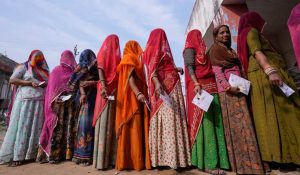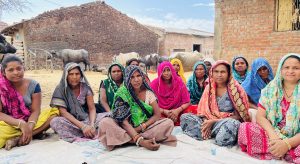Why Haryana’s Young Women Hope Against Hope For A Government Job
The only way to fob off matrimony and find independence is to ensure that you land a government job, say young women at a Rohtak campus
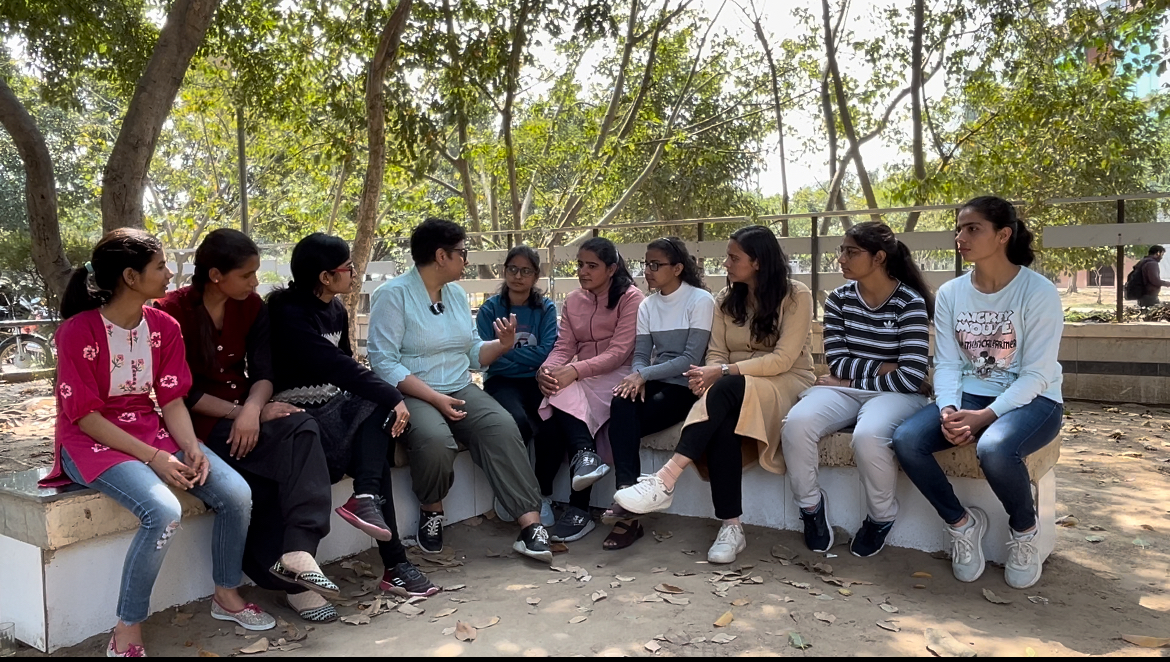
For Shanti Sharma, 26, this year is crucial. She has to land a government job as a Trained Graduate Teacher (TGT) or succumb to social pressure to get married.
Every morning for the last three years, Shanti has been coming to the library of the Maharishi Dayanand University (MDU) in Rohtak. She stays till late evening though she is no longer a student here. “Government exams ki tayyari karti hoon (I am preparing for government exams),” she said when we met a couple of months ago.
During her breaks, she chats with her friends, young women and men, and their conversations almost always hinge around jobs, vacancies and recruitment exams.
Kanta* (name changed) also goes to the library but in the evenings. During the day, she works as a contractual TGT at a government school in Gohana tehsil in Sonepat, 35 km away from here. She is exhausted at the end of the long working day, but this is the only time she gets to prepare for the same set of exams which will get her a secure government job with benefits. Her family has hopes that this will see them out of poverty.
Shanti, a Brahmin from a landowning family and Kanta, a Dalit whose family are landless, come from different socio-economic backgrounds. What they have in common is the aspiration for a permanent government teaching job.
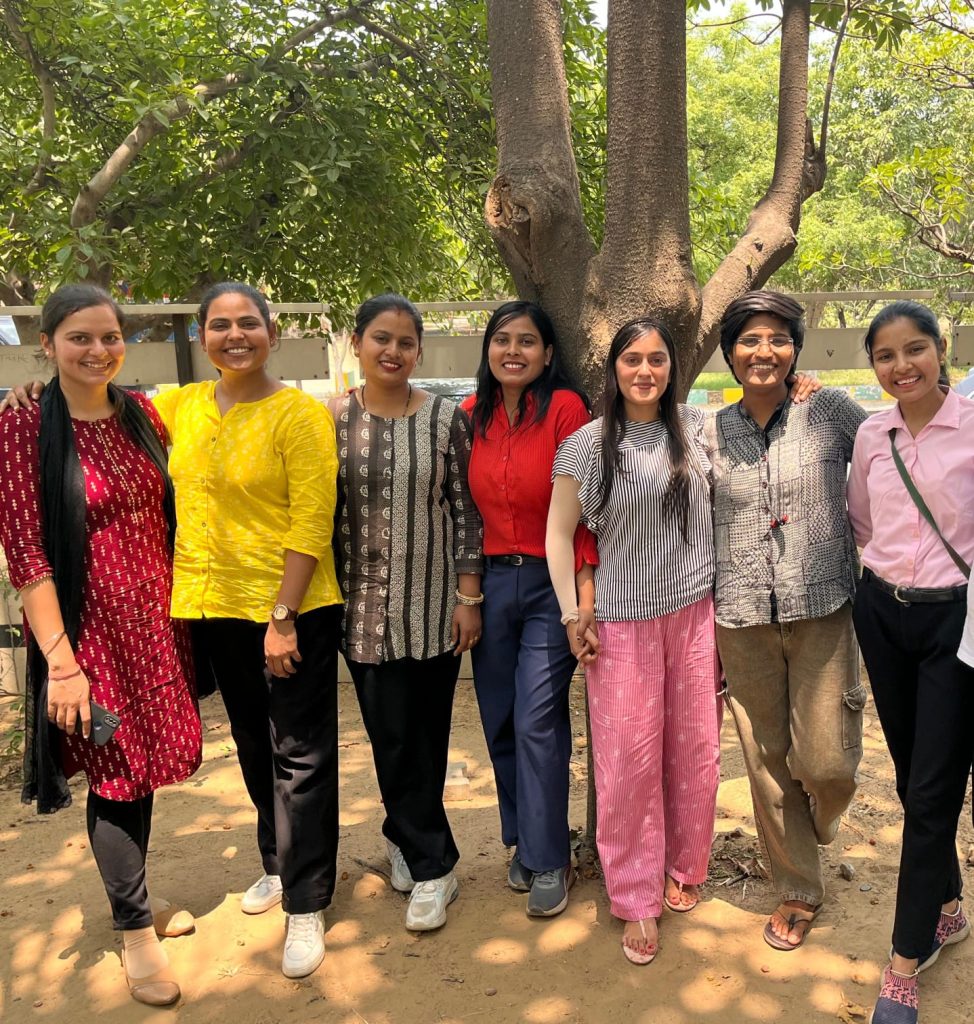
Young women and men were hanging out on the sprawling lawns of the Swami Vivekanand library of the MDU, one of Haryana’s top universities; some in groups and others, like Sonu Kakkad, a postgraduate in botany, eating her packed lunch on her own. Our conversations with many of them revealed a sense of anger and frustration at the growing unemployment, government’s apathy and a looming anxiety about their future.
More women are getting a higher education, outnumbering men, in Haryana since 2018 per the All India Survey of Higher Education (AISHE). According to the latest survey in 2021, 5.62 lakh women and 5.42 lakh men were enrolled across all higher education courses. This, however, has not translated into jobs. Between January and March 2024, the unemployment rate among women in the 15-29 age group surged to 13.9%, up from 5.4% in the previous quarter, according to data from the Centre for Monitoring of Indian Economy (CMIE).
Government jobs have been dwindling in the last decade but we found every youngster we met in Rohtak is willing to strive for years to secure these. Why do they not consider private employment? We detail the reasons later but primarily it is the belief that sarkari (government) is “safe”, especially for girls in terms of what is socially acceptable. There was also the sense that their education had not prepared them with the sort of skills needed for the private sector.
In a deeply patriarchal state, infamous for its highly skewed sex ratios, high rates of female foeticide and infanticide, the tyranny of khap panchayats and honour killings, we found women determined to get an eduaction and secure jobs as a pathway to autonomy. Their allies in this mission are their families who support them with the necessary social, emotional and economic investments.
We met women like Sonu’s mother, who is herself a highschool graduate but took an early stand that her daughters should find jobs and be independent of their husbands. But soaring unemployment, lack of government jobs and the push towards privatisation and contractualisation of jobs is hitting women hard. It has left women anxious about their future with the fear of being pushed into matrimony and dependence and the rollback of their hard-won freedoms.
Breaking Norms

Shanti was 18 when her “daddu (paternal grandfather)” got the first rishta (matrimonial alliance) for her. Always stubborn, she had told the family that there were two decisions she would take on her own — marriage and career choices. Her family gave in. She went on to get a Masters in English literature and a Bachelors in Education (B.Ed), a prerequisite for teaching jobs.
Since then she has appeared for recruitment exams for Kendriya Vidyalayas where she was unsuccessful and the Haryana government’s TGT exam conducted by the Haryana staff selection commission (HSSC) in 2023. She is now preparing for Delhi government’s SSC exam.
“For women of my generation, education and jobs are not just to make us ‘marriage ready’. It is also to find a room of one’s own,” she says, alluding to the title of the essay by her favourite writer, Virginia Woolf. There is a self-imposed pressure to break norms, she says, not just for herself but for future generations because she is tired of women’s contributions being invisible: “Umr beet jaati hai aur log poochhte hain ‘Kya kiya? Rotti banayi, bas (an entire lifetime passes and women are asked if they have been useful enough)?’”
As first-generation university goers, these women are aspiring for something bigger than financial independence — self respect.
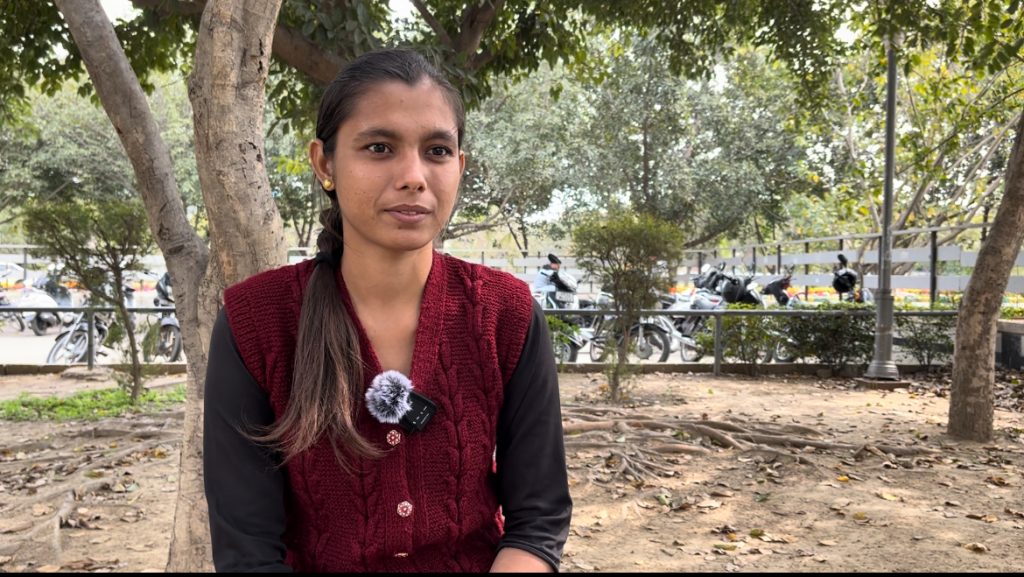
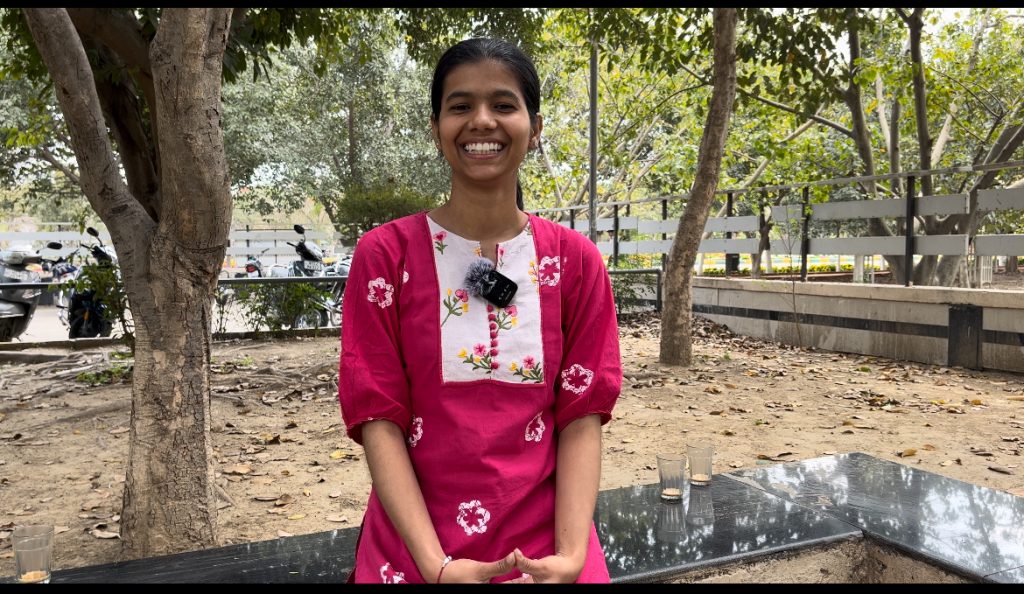
Tanu Duhan and Neha, both 21, studying for a Masters in Geography at MDU are not in the job market yet, but they are clear about what jobs mean to them. Both women travel at least 35 km from their villages to attend university in Rohtak.
“In our society, men’s views are taken seriously. When we get a job and become financially independent, we would be taken seriously too. Warna kahenge, ‘Tanne ke? Tu konsa bahar jaave (else people ask: why do you matter? You don’t have to step out).’ Hai na?” asks Neha looking at Tanu.
Tanu nods vigorously. “I want the thinking of my village to change. When a girl gets an education and a job, she doesn’t do it for herself alone. She does it for her mothers, grandmothers, sisters and other women in the community.” And it is in these mothers and grandmothers that young women find the support to forge new paths.
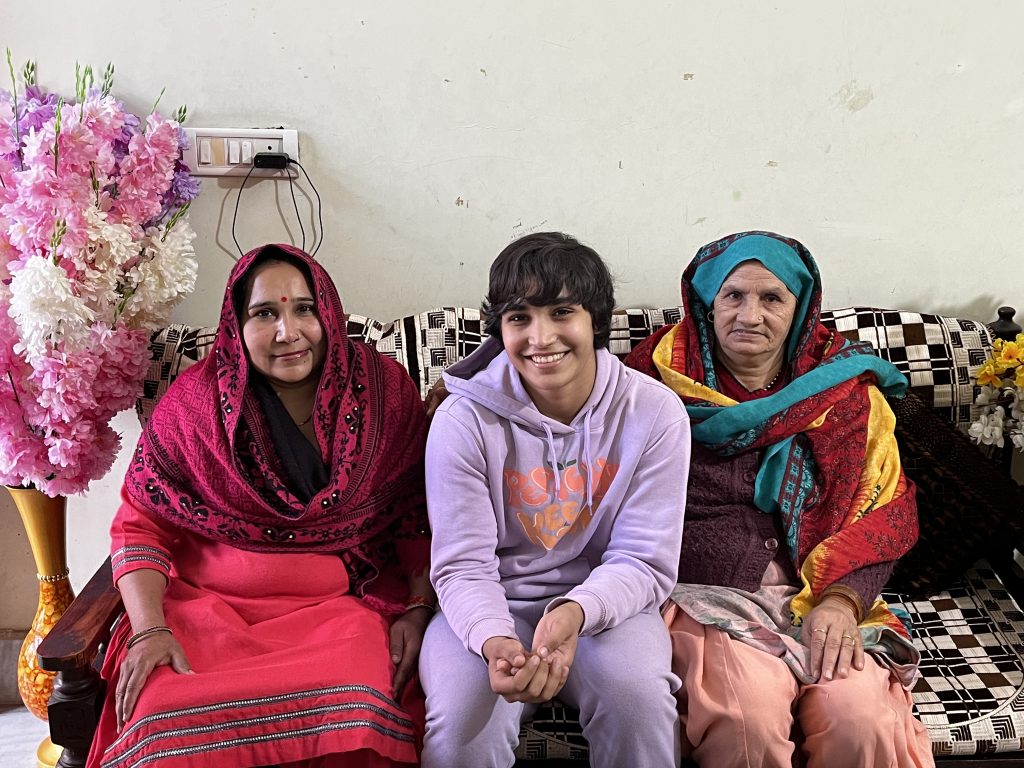
Sarika, 18, a budding wrestler in Rohtak has two women standing strongly behind her — mother Urmila and her grandmother Surajmukhi. The family moved from their ancestral village in Baroda in Sonepat district to Rohtak city when she was just three-years-old so she could get an English medium education. In 2016, when Sarika took to wrestling inspired by Sakshi Malik’s Olympic bronze, her mother gave up her aspiration to get a government job to focus on her daughter’s sporting career. Urmila had once dreamt of studying law but her brother refused to invest in her education, a hurt she carries to this day.
“Many times families do not let us achieve our aim in life. I want Sarika to go after what she desires. I don’t want a repeat of what happened to me,” she says. She observes that increasingly women who want to study are being supported by their families. The pressure to marry arises when a woman is neither studying nor gainfully employed, she says.
“Marriage leaves you no time for yourself,” adds Surajmukhi, who has been supportive of both Sarika and her mother.
Sometimes, it is the in-laws who support the women. Pinky, 36, is studying for a Masters in Geography, 12 years after she quit her studies post marriage. She resumed her studies after the death of her conservative mother-in-law, this time with unwavering support from her father-in-law who looks after her young children. She regrets not fighting for herself enough all those years ago but is determined to make a career now.
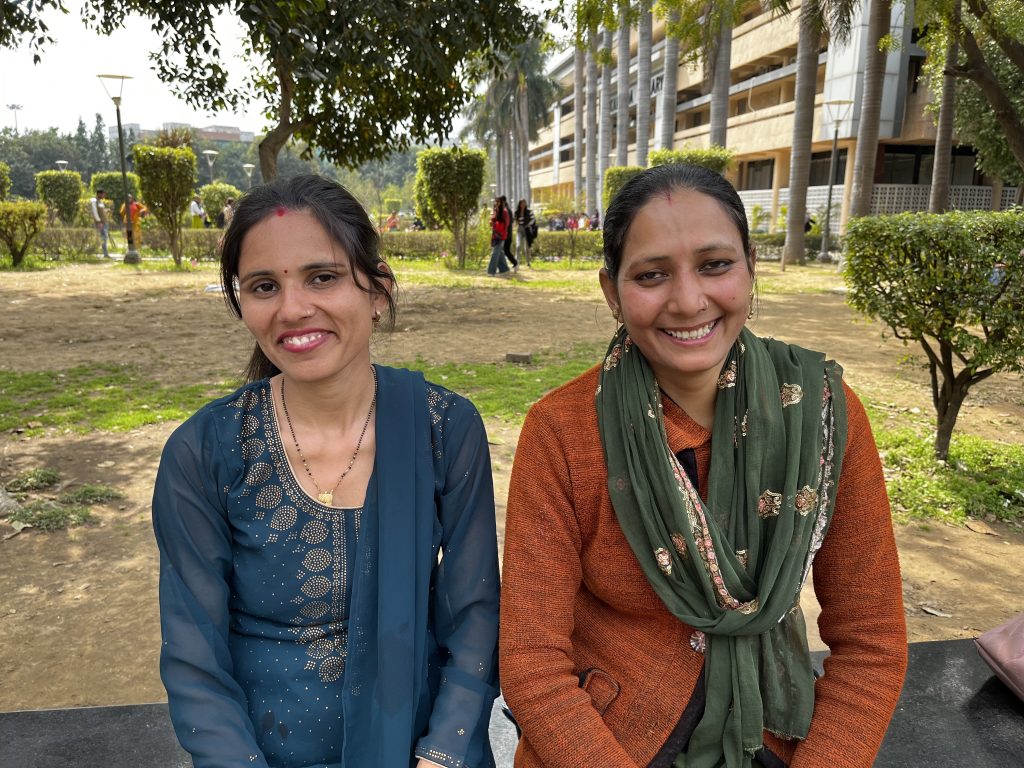
A job, then, becomes crucial for women in Haryana, As Preethi, a PhD student, put it: “Itna padh likh ke kya fayda agar fir humein ghar ke kamon mein phasa diya jayega (what use is all this education if we are to be trapped yet again in household chores.)”
Rollback Of Government Jobs
In the last decade, the Haryana government has been rolling back permanent government recruitments. The last recruitment for PGT (Post Graduate Teacher) and TGT jobs were held in 2013 when the Bhupinder Hooda-led Congress government was in power. In 2015, another round of recruitment was advertised for 1035 TGT posts by the Haryana Staff Selection Commission, which was later withdrawn by the state in 2021 after the matter went to the Punjab and Haryana High Court. In April 2023, the government advertised for a fresh round of recruitment for 7471 teaching posts.
Shanti, who sat for the last exam, is still awaiting the results as it has been challenged in the High Court. “I still consider myself lucky that I have been in the job market for only three years. There are those who cleared the exams back in 2013 and are still waiting for appointments,” she says.

The posts for TGT in Sanskrit were filled in 2023, a decade after the exams were held. The last permanent recruitments in higher education teaching jobs were made in 2018.
Most Group C and D posts are stuck in a limbo for the last three years, says Manish Kumar, who runs a group of coaching academies in Rohtak that train students for defence and civilian recruitment exams. When Manish started his coaching centre in 2008, 280 of the 300 students getting coaching for Haryana Teacher Eligibility Test (HTET), a qualifying test for teaching jobs, were women. He has seen that number dwindle over the years. In the last round, HTET applications declined by 17% per government data. Meanwhile there are 30,000 vacant teachers’ positions in the state by the government’s own admission in the High Court.
After women started to be recruited for the Short Service Commission (SSC) in 1992, Haryana saw a boom in women appearing for the exam. Defence services became an alternative and we saw a surge in women getting coaching for SSC exams, says Manish Kumar.
In 2020, women were given a permanent commission in the defence services on par with men, after a Supreme Court ruling. But the openings are not equal for men and women. Of the 400 vacancies advertised by the National defence Academy this year, less than 10% (31) are for women. The disparity is evident in Delhi Police (4453 for men and 2491 for women) and Haryana Police (5000 for men and 1000 for women) recruitments as well, both being preferred choices for women as a career choice.
The Agnipath scheme introduced by the government of India made things worse for women. The scheme recruits soldiers, aka Agniveers for a period of four years and at a monthly salary of Rs 30,000 without other government perks and benefits. At the end of four years, only 25% of the Agniveers are offered permanent recruitment in the defence services. While the applications for the Agniveer recruitments have gone up by 10% over the last year, parents are not keen on sending their girls. “They see no point in making an investment when they will be out of a job in four years,” says Manish. But women, he adds, are convincing their families saying “Shadi ka kharcha nikal jayega (the income will pay for our weddings).”
For civilian jobs, the government of Haryana has been making most of its recruitments through the Haryana Kaushal Rozgar Nigam (HKRN), a company ‘set up with the objective of providing contractual manpower to all government entities in Haryana’. The Nigam has recruited 90,000 employees on a contractual basis, of which up to 5000 are teachers.
This contractualisation of jobs is hitting women job seekers hard and shattering their self-confidence, says Manish Kumar.
Kanta is one of the TGTs recruited by the HKRN in March on a monthly salary of Rs 23,500. The salary for a permanent TGT starts at Rs 80,900.
“The government is getting four teachers for the price of one,” says Kanta with a laugh.
Her one year contract says that she could be terminated anytime on recommendation of the head teacher for any reason ranging from lack of funds, rationalisation of vacancies or if a regular teacher joins the school.
Kanta has not received her salary until now. This is adding to her financial stress as she has to borrow money from her brother who single handedly supports the family of 14, to live in Rohtak, even though her school is closer to her family home in Sonepat district, where she has better access to resources to prepare for exams for permanent teaching positions. She is preparing for the upcoming Delhi and Chandigarh staff selection commission exams for TGT recruitment. “It’s a government job or nothing for me. There is no second option,” she says.
Why Women Want Govt Jobs
“Government jobs come with security and better pay”, says Shanti. A government teacher’s salary for a TGT position is 80,000 whereas in a private school, one starts anywhere between Rs 8000 to Rs 10,000 and the workload is heavy, say most women Behanbox spoke to. Monika Sharma joined a private school in 2019 after her Masters and her salary rose from Rs 17,000 to Rs 52,000 but she is not happy. She is now getting a HTET to apply for a government teaching job.
“Besides, in a patriarchal society like ours, they are a more permissible avenue for families too who consider it safe,” Shanti emphasises. There is a sense of ‘respect’ associated with a government job. Families are apprehensive of the ‘westernisation’ of corporate workplaces and would prefer their young women to remain closer home where their kinship networks can keep an eye on them, say the women we interviewed. A 2016 UNDP project called Disha recognised this as an issue and started an experiment to connect women with local medium and small scale enterprises.
For Sonu Kakkad, a government job would free her from her family’s expectations and perhaps also give her the necessary savings to do other things. “I can never get the investment to start a business even if I wanted to. If I have money of my own, I can at some point,” she says. “Parents invest in sons for entrepreneurship but not women because, at the end of the day, we are ‘paraya dhan (belong to their in laws),’” she says.
Sat Singh, a journalist based in Rohtak puts this aspiration into perspective. “Women in Haryana have fire in their belly but our economic system is broken. In a largely agrarian society like Haryana, with distress hitting hard, farms becoming unproductive and lack of entrepreneurial skills, the government has become the mainstay for jobs.”
He has seen this rise in aspiration coincide with Geeta Phogat winning a gold medal in the Commonwealth games in 2010 followed by Sakshi Malik winning an Olympic bronze in 2016 Rio Olympics. Both women got government jobs, the former with the Haryana police and the latter with the railways. Now, along with defence and civilian jobs, sport has also become an avenue to fulfil that aspiration.
“Parents with even half an acre of land are investing in sports with the Haryana government reserving jobs for medal winners,” he says. “Young men and women are not equipped with skills for the corporate or manufacturing sector.”
Shanti agrees but puts it down to more structural issues. “Our education system is equally responsible where we are not made aware of or given skills for any other alternative career choices,” she says. It is a cycle where women spend most of their time preparing for a government job and there is little time left for developing other skills. “I have a Masters in English and I could look for editorial or translation jobs but I just don’t know how to get started.” She feels if government vacancies were advertised and filled on time, those who are not able to get one can move on. The uncertainty is what hurts more.
Women also realise that government jobs are few and not everyone can secure one. “I am not equating employment with a government job alone. But isn’t it the business of the government to create more employment opportunities for women?” asks Tanu.
Our Newsletter
Subscribe to Our Newsletter
We believe everyone deserves equal access to accurate news. Support from our readers enables us to keep our journalism open and free for everyone, all over the world.
